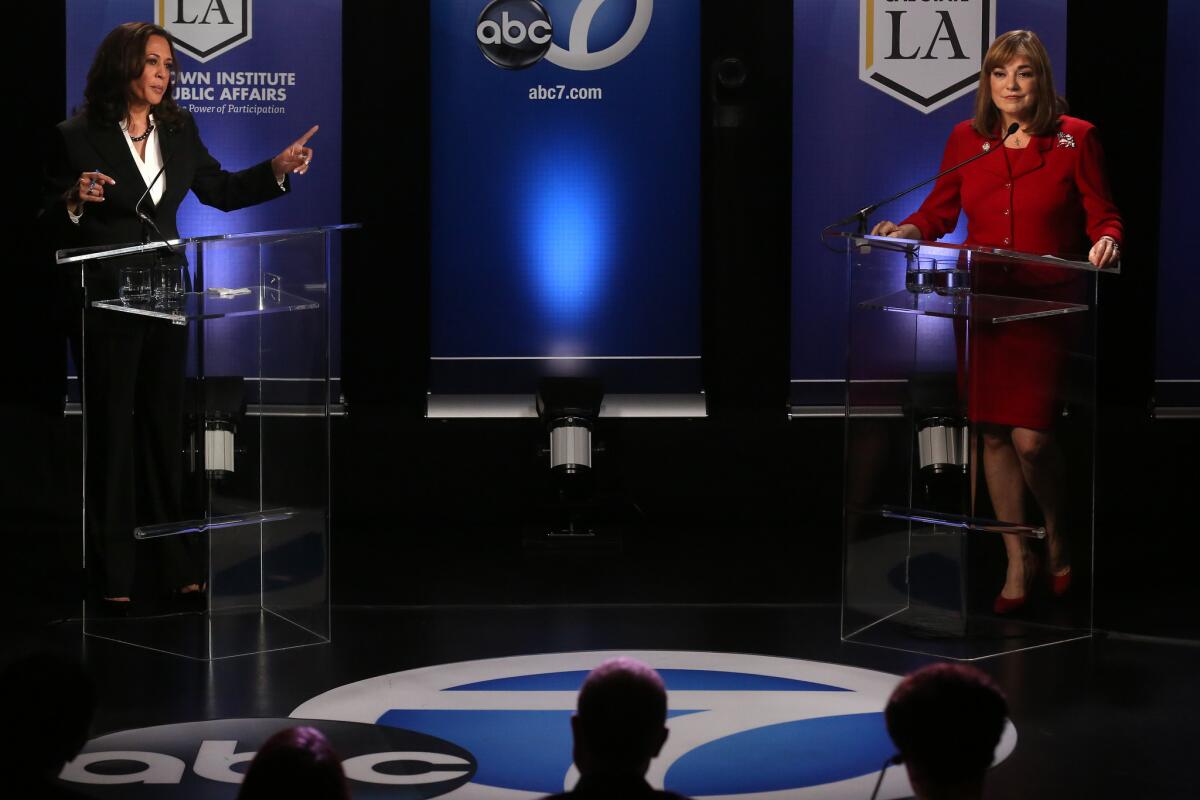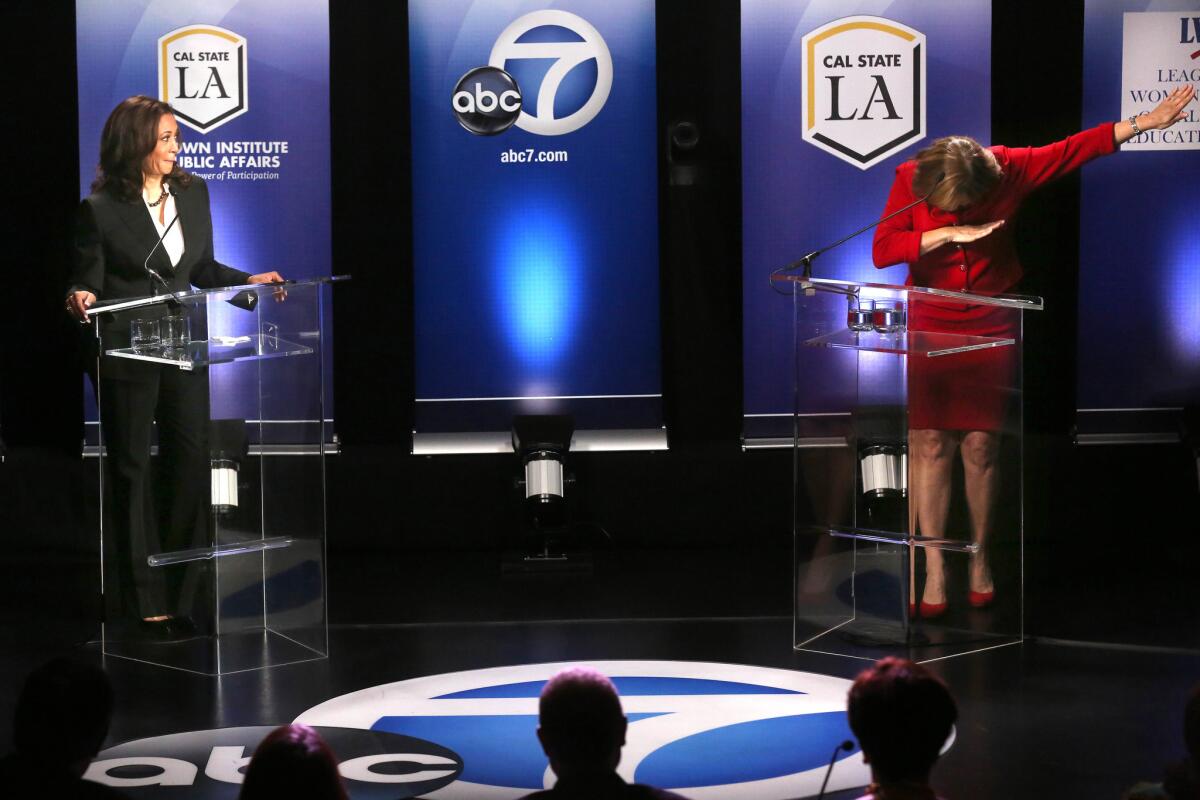Buttressed by the support of top Democrats, Kamala Harris shores up her lead after U.S. Senate debate

- Share via
After spending more than a year meticulously crafting a U.S. Senate campaign to conjure up an air of inevitability, state Atty. Gen. Kamala Harris appears as close to Washington as ever after delivering a measured debate performance Wednesday night and winning the coveted endorsements of California’s two senators just hours later.
In a Senate face-off largely eclipsed by the daily theatrics and turbulence of the nation’s presidential race, Harris’ campaign has slowly and steadily picked up momentum as the months ticked closer to the November election — first capturing the support of the California Democratic Party, then Gov. Jerry Brown, then President Barack Obama and finally, U.S. Sens. Barbara Boxer and Dianne Feinstein on Thursday. On the debate stage, Harris largely kept her cool, even when hit with some stinging criticism, and shed the cautious, carefully scripted style many voters have seen throughout most of the campaign.
In her endorsement, Boxer praised Harris as a champion of the progressive cause, saying the attorney general was the clear choice to be her successor as she retires after four terms in the U.S. Senate. The decision by Boxer and Feinstein was a clear repudiation of Harris’ rival, Orange County Rep. Loretta Sanchez, a fellow Democrat who has served in Washington with the senators for nearly two decades.
The Sanchez campaign’s response to the Boxer and Feinstein announcement was tellingly sedate. Campaign spokesman Luis Vizcaino simply noted how well the three worked together on issues crucial to the state and the nation, saying the congresswoman will continue to be a “voice for the people of California.” The statement was vastly different from another issued in July when Obama endorsed Harris. Sanchez lashed out at the president, saying that “the “political establishment would rather have a coronation instead of an election for California’s next U.S. senator.”
At Cal State L.A. on Wednesday night, Harris faced perhaps the greatest challenge of the campaign: the lone chance to debate Sanchez one-on-one. As the clear front-runner, Harris had the most to lose by giving her challenger the air time and opportunity to close the gap.
The state attorney general touched on a progressive agenda that has given her appeal among California’s liberal base and the state’s most influential Democratic leaders.
Harris efficiently laid out her record as attorney general, though at times seemed rushed to pack in several talking points during the time allotted. From the outset, though, Harris went on the offense, repeatedly chiding Sanchez for missed votes and committee hearings in her nearly 20-year congressional career.
“I think it’s important that you show up,” Harris said in a refrain she would repeat several times during the debate. She delivered those jabs bluntly and repeatedly, dismissing Sanchez’s world travels as a member of the House Armed Services committee as merely “stamps in [her] passport.”
Sanchez was not as restrained. Known for her off-the-cuff style, she openly mocked Harris at times, interrupting her and punctuating her points with exaggerated hand gestures. She defied the moderator’s attempts to keep her answers within the allotted time, dropping into a dramatic bow after he cut off her closing argument. The pose was captured by a Los Angeles Times photographer, and the image was quickly shared across social media as viewers speculated that Sanchez may have ended the debate on a lighthearted note by “dabbing,” a move popularized by NFL quarterback Cam Newton.

Kamala Harris watches as rival Loretta Sanchez strikes a pose after her closing statement during their U.S. Senate debate held at Cal State L.A.
But Sanchez leveled some stinging blows during her performance, painting the attorney general as aloof and overly ambitious, and accusing her of being the darling of the Democratic establishment and favoring posh hotels while on the campaign trail. She accused Harris of being “all talk” and went after her record on water policy, feigning mild disgust that the attorney general once told the Sacramento Bee’s editorial board that she was unfamiliar with the two largest proposed reservoirs in California.
Debate panelist Raphael J. Sonenshein, director of the college’s Pat Brown Institute for Public Affairs, said from his close vantage point the debate offered a fascinating and striking contrast between the two Democratic Senate candidates.
“Sanchez drew more energy as her answers proceeded, and focus,” Sonenshein said. “As the underdog, she really took some opportunities to get some jabs in that I think were successful.”
Sonenshein said Harris’ answers were more structured, though not in an artificial way, and showed the deft political skills of a former prosecutor and two-term state attorney general.
“Harris didn’t fall back on defense and fall back on canned answers, which I think was good from her standpoint,” Sonenshein said.
Throughout the night, both candidates seemed intent on attacking and diminishing their rival’s greatest strengths.
Sanchez, a member of the House Armed Services and Homeland Security committees, spent the evening touting her travels to war zones, her work with the North Atlantic Treaty Organization, familiarity with world and military leaders and her expertise on threats facing the nation. Harris countered by criticizing Sanchez over reports that she was absent from numerous Homeland Security committee meetings, and missed hearings for an anti-terrorism task force that she chaired in Congress.
“You can travel and have a lot of stamps in your passport, but when you’ve been appointed to be the chair of the anti-terrorism task force and you don’t show up once, that should call into question your commitment to protecting our country’s national and security interests,” Harris said. “The voters have a choice here in this election, on this issue, and it’s about who shows up and who gets things done.”
Sanchez in turn went after Harris on criminal justice. She criticized Harris for opposing legislation that would strengthen statewide requirements for police body cameras and a bill that called for the attorney general to conduct independent investigations of fatal, officer-involved shootings. She laid the recent rise in sexual assaults and homicides involving handguns at Harris’ feet as California’s top law enforcement officer.
Wednesday’s debate is unlikely to have an immediate impact on the race for the first open Senate seat California has seen in 24 years. But in the final weeks of the campaign, voters may see snippets from the debate repackaged into biting television campaign ads and political attack mailers, expanding the event’s potential impact on the race.
Harris has led in all the recent opinion polls, though a poll last month from the Public Policy Institute of California showed Sanchez narrowing the gap in recent weeks. But Harris has the advantage of having won two statewide general elections — narrowly clinching her first campaign for attorney general in 2010 and then breezing to reelection in 2014 — and has the strong backing of the California Democratic Party, with all of its money and troops of volunteers.
Perhaps the most glaring absence in the debate Wednesday was the lack of a Republican voice to challenge the pronouncements, promises and policies aired by the two Democrats. That’s the consequence of California’s top-two primary system, which sent the two candidates who received the most votes in the June 7 primary to the general election, regardless of party.
There was no candidate on stage to press Harris on her record defending so-called sanctuary cities, or to pressure Sanchez to explain her vote in support of President Obama’s nuclear deal with Iran. Neither candidate was challenged about why they opposed the Trans-Pacific Partnership trade deal.
Instead, Wednesday’s debate focused on the narrow policy differences between two Democrats who align on the vast majority of the issues facing the country. A significant number of Republicans and independents remain undecided or say they won’t vote in November, knowing that California will send a Democrat to Washington no matter who wins.
“So much about this race will depend on turnout,” Sonenshein said. “That’s what makes it so interesting.”
Election 2016 | California politics news feed | Sign up for the newsletter
Follow @philwillon on Twitter
ALSO
Loretta Sanchez dabbed. Kamala Harris threw shade
Updates on California politics
More to Read
Get the L.A. Times Politics newsletter
Deeply reported insights into legislation, politics and policy from Sacramento, Washington and beyond. In your inbox three times per week.
You may occasionally receive promotional content from the Los Angeles Times.










